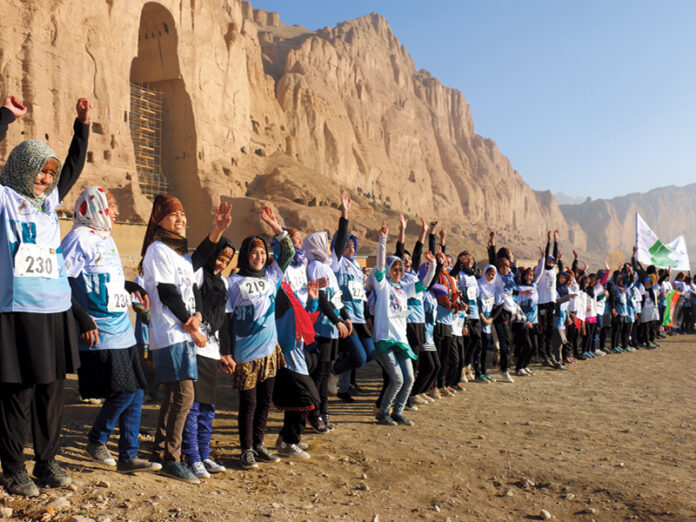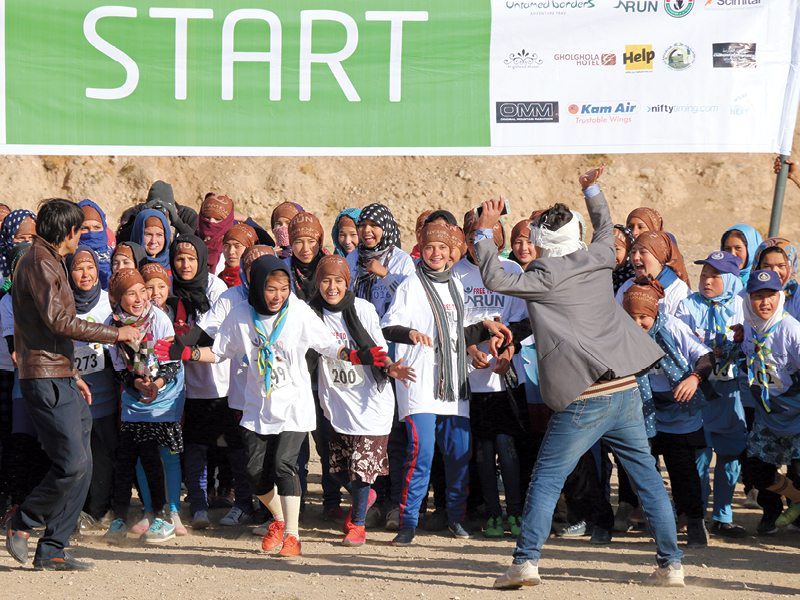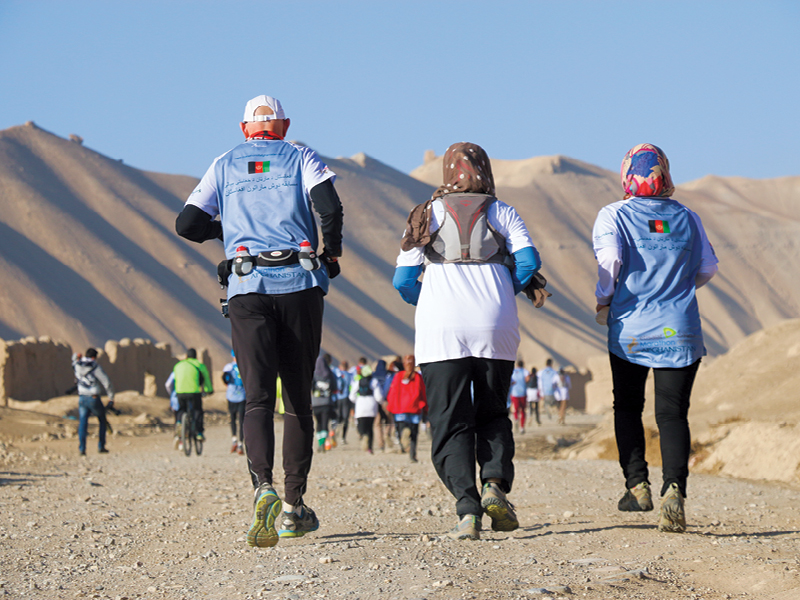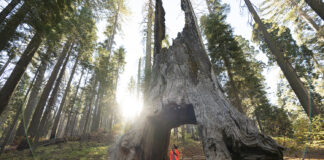
Dust swirls around the runners’ shuffling feet. Wherever I look, excited faces peer back, eager for the race to begin. The early morning light glances off the hollow caves and cliffs where 53-metre Buddhas once looked out over the mountainous Afghan city of Bamian, before becoming target practice for the Taliban. Now only the ravages of war remain, that and the scene in front of me, the second Marathon of Afghanistan.
In 2015, adventure tour guide Gull Hussein and ultra-marathoner James Bingham started this event, the country’s first marathon and first mixed gender race. They felt this race could bring together people of different genders, cultures, beliefs and abilities under the umbrella of running. Both have daughters and want to create a world of equality. They created a safe place for women in Afghanistan, free from violence, free from ridicule, free to run.
If you had asked me four months before this race if I would run a marathon, I would have laughed. Sure I ran, but as I told my sister when she signed up for her first half-marathon, “I can’t understand why anyone would want to run that long!” In truth, I was scared of being alone with my thoughts for hours on end. Sometimes my thoughts feel overwhelming. My negative self-talk kicks in and says, “Nothing you do matters. You’re all alone. No one will want to be with you.” There are times when these messages play on a loop in my brain, spinning around at a nauseating speed. One way I could block them was to head off alone to run fast and hard enough that I was finally too exhausted to think. I wondered how I would cope with hours alone and nothing but my own thoughts?
I heard about the Marathon of Afghanistan from Canadian marathoner Martin Parnell. Martin had completed 250 marathons in one year at age 55 as a fundraiser for Right to Play. At 59, he was diagnosed with a blood clot in his brain. As he was lying in the hospital, unable to walk, he read about the Marathon of Afghanistan and was inspired by the story of Zainab. She had been unable to train outdoors as children threw rocks at her, adults called her a prostitute and the Taliban threatened her. Despite these challenges, she trained in her enclosed front yard and persevered to become the first Afghan woman to complete a marathon in Afghanistan. Martin vowed that if he recovered, he wanted to run alongside these courageous Afghan women. Martin made me think of the marathon in a different way. I wanted to stand next to these women and let them know they inspired me, they weren’t alone and that halfway across the world, their story had touched me.
Their vision of an Afghanistan where women are free to run compelled me to join them. Their story needed to be told so I accepted Martin’s generous offer to coach me through his training program of 800K over four months because I knew if I was going to tell this story, I had to be brave enough to run with them. If it all worked out, we would share their story through a documentary film called The Secret Marathon.

It was not without risk. When we found out the route only a week before the race, we were sworn to secrecy to avoid being targeted by terrorists. It was easy to forget the risk each person here had taken. However, you had only to glance over at the armed guards that lined the entire route and the National Defence Service trucks that followed closely behind each female runner to be reminded this is a country still very much at war.
If you want to run fast, run alone, if you want to run far, run together.
Earlier in the week, I went with the Afghan women runners on a hike into the gently sloping mountains to acclimatize to the elevation. “I run to be free,” Nelofar, the captain of Afghanistan’s first women’s running club, tells me on our walk. Her dream is to see women from all cultures participate. She is ethnically half Tajik and half Pashtun, whereas most of the people in Bamian are Hazara, an ethnic minority with more liberal leanings. “I could convince a hundred Hazara girls to join,” she says, “but one other Pashtun, that has been a problem.” Nelofar’s Pashtun culture is much more conservative. She tells me she often feels alone as she struggles for change. I turn to Nelofar and tell her she inspires me. I know she will keep making a difference. “I just wish I had a someone to help me,” she says.
This race is an out and back route along a dirt path that merges onto asphalt. It starts at 2,500 metres, climbing another 500 metres up the mountainous desert region for the first half and then downhill for the second half. With only 75 per cent of the oxygen I’m used to breathing, I can feel my lungs gasping for every bit of breath. I, like all the woman, run wearing hijab, modest loose clothing covering everything but our faces and hands. We smile at each other, each woman giving me a giant high-five and reaching out to hug me as I pass. Six Afghan women run in the marathon along with seven women from other countries, 76 Afghan men and 11 international men also run. It is a beautiful symbol of men and women coming together to run for freedom.

The constant uphill makes my legs heavy and I can feel myself slowing as though running through molasses. I think of the women I have been training with and of my friends, family and my husband, Leor, who trained with me. They are with me in spirit as I struggle up the hill. I keep going, hoping my run can make the journey easier for these Afghan women.
I am reminded of an African proverb: “If you want to run fast, run alone, if you want to run far, run together.” I ran fast to outrun my thoughts in the past, but now running far, I was building a community. Just as I am reflecting, a young Afghan man in his early 20s runs alongside. “Do you mind if I run with you?” he asks. “I find it makes the time pass more quickly if you can talk with someone else.” I smile. The right person has come along when it seems too difficult, reminding me that the messages in my head are wrong. I can make a difference. I am not alone and others will join me. I look at this young Afghan man, and I feel hopeful. Although there are only six Afghan female marathoners, the ripple effect of their story will inspire more.
Instagram: @thesecretmarathon Twitter: @asecretmarathon















